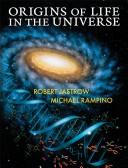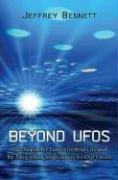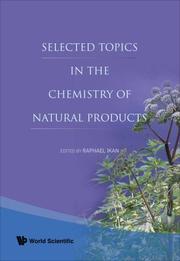| Listing 1 - 9 of 9 |
Sort by
|

ISBN: 9780521825764 0521825768 9780521532839 0521532833 Year: 2008 Publisher: Cambridge : Cambridge university press,
Abstract | Keywords | Export | Availability | Bookmark
 Loading...
Loading...Choose an application
- Reference Manager
- EndNote
- RefWorks (Direct export to RefWorks)
Cosmology. --- Exobiology. --- Life --- Origin.

ISBN: 9780691135496 0691135495 Year: 2008 Publisher: Princeton (N.J.) : Princeton university press,
Abstract | Keywords | Export | Availability | Bookmark
 Loading...
Loading...Choose an application
- Reference Manager
- EndNote
- RefWorks (Direct export to RefWorks)
Describes the startling discoveries being made in the very real science of astrobiology, an intriguing new field that blends astronomy, biology, and geology to explore the possibility of life on other planets. Jeffrey Bennett takes readers beyond UFOs to discuss some of the tantalizing questions astrobiologists grapple with every day: What is life and how does it begin? What makes a planet or moon habitable? Is there life on Mars or elsewhere in the solar system? How can life be recognized on distant worlds? Is it likely to be microbial, more biologically complex--or even intelligent? What would such a discovery mean for life here on Earth?--From publisher description.
Exobiology. --- Life on other planets. --- Life --- Origin.
Book
ISBN: 9786611998684 1281998680 0191551538 9780191551536 9780191777011 0191777013 0199226326 9780199226320 9780191578786 0191578789 6611998683 9781281998682 Year: 2008 Publisher: Oxford Oxford University Press
Abstract | Keywords | Export | Availability | Bookmark
 Loading...
Loading...Choose an application
- Reference Manager
- EndNote
- RefWorks (Direct export to RefWorks)
This title presents a succinct and accessible guide to the key episodes in the story of life on Earth - from the very origins of life four million years ago to the extraordinary diversity of species around the globe today.
Life --- Abiogenesis --- Biogenesis --- Germ theory --- Heterogenesis --- Life, Origin of --- Life (Biology) --- Origin of life --- Plasmogeny --- Plasmogony --- Evolution (Biology) --- Exobiology --- Spontaneous generation --- Origin. --- Origin

ISBN: 1281938408 9786611938406 9812790780 9789812790781 9812705694 9789812705693 Year: 2008 Publisher: Singapore World Scientific
Abstract | Keywords | Export | Availability | Bookmark
 Loading...
Loading...Choose an application
- Reference Manager
- EndNote
- RefWorks (Direct export to RefWorks)
Contains specialized work that describes the chemistry of separate classes of compounds such as steroids, terpenes, alkaloids, sugars, carotenoids, fatty acids and so on. This work covers the following topics of natural products: cannabinoids, toxic constituents from marine sources, natural sweeteners, generation of wines, and more.
Natural products --- Life --- Chemistry, Organic. --- Abiogenesis --- Biogenesis --- Germ theory --- Heterogenesis --- Life, Origin of --- Life (Biology) --- Origin of life --- Plasmogeny --- Plasmogony --- Evolution (Biology) --- Exobiology --- Spontaneous generation --- Products, Natural --- Raw materials --- Organic chemistry --- Chemistry --- Synthesis. --- Origin. --- Origin
Book
ISBN: 1281862266 9786611862268 3540768866 3540768858 Year: 2008 Publisher: Berlin : Springer,
Abstract | Keywords | Export | Availability | Bookmark
 Loading...
Loading...Choose an application
- Reference Manager
- EndNote
- RefWorks (Direct export to RefWorks)
"How did life originate and why were left-handed molecules selected for its architecture?" This question of high public and interdisciplinary scientific interest is the central theme of this book. It is widely known that in processes triggering the origin of life on Earth, the equal occurrence, the parity between left-handed amino acids and their right-handed mirror images, was violated. The balance is inevitably tipped to the left – provoking that life’s proteins today exclusively implement the left form of amino acids. Written in an intoxicating style, this book describes how the basic building blocks of life, the amino acids, formed. After a comprehensible introduction into stereochemistry, the author addresses the inherent property of amino acids in living organisms, namely the preference for left-handedness. What was the cause for violation of parity of amino acids in the emergence of life on Earth? All the fascinating models proposed by physicists, chemists and biologist are vividly presented including the scientific conflicts. The author describes the attempt to verify any of those models with the chirality module of the ROSETTA mission, a probe built and launched with the mission to land on a comet and analyse whether there are chiral organic compounds that could have been brought to the Earth by cometary impacts. A truly interdisciplinary astrobiology book, "Amino Acids and the Asymmetry of Life", will fascinate students, researchers and all readers with backgrounds in natural sciences.. With a foreword by Henri B. Kagan.
Exobiology. --- Life --- Asymmetry (Chemistry) --- Origin. --- Astrobiology --- Biology --- Habitable planets --- Molecular asymmetry --- Stereochemistry --- Abiogenesis --- Biogenesis --- Germ theory --- Heterogenesis --- Life, Origin of --- Life (Biology) --- Origin of life --- Plasmogeny --- Plasmogony --- Evolution (Biology) --- Exobiology --- Spontaneous generation --- Origin --- Biochemistry. --- Bioorganic chemistry. --- Astrobiology. --- Astrophysics. --- Protein Science. --- Bioorganic Chemistry. --- Biogeosciences. --- Space Sciences (including Extraterrestrial Physics, Space Exploration and Astronautics). --- Biochemistry, general. --- Astronomical physics --- Astronomy --- Cosmic physics --- Physics --- Bio-organic chemistry --- Biological organic chemistry --- Biochemistry --- Chemistry, Organic --- Biological chemistry --- Chemical composition of organisms --- Organisms --- Physiological chemistry --- Chemistry --- Medical sciences --- Composition --- Proteins . --- Geobiology. --- Space sciences. --- Science and space --- Space research --- Cosmology --- Science --- Earth sciences --- Biosphere --- Proteids --- Biomolecules --- Polypeptides --- Proteomics
Book
ISBN: 9783540756781 3540756787 3642094848 9786611141028 128114102X 3540756795 Year: 2008 Publisher: Berlin : Springer,
Abstract | Keywords | Export | Availability | Bookmark
 Loading...
Loading...Choose an application
- Reference Manager
- EndNote
- RefWorks (Direct export to RefWorks)
This book explicitly investigates issues of astrobiological relevance in the context of cold aqueous planetary geochemistry. At the core of the technical chapters is the FREZCHEM model, initially developed over many years by one of the authors to quantify aqueous electrolyte properties and chemical thermodynamics at subzero temperatures. FREZCHEM, of general relevance to biogeochemists and geochemical modelers, cold planetary scientists, physicochemists and chemical engineers, is subsequently applied to the exploration of biogeochemical applications to solar systems bodies in general, and to speculations about the limits for life in cold environments in particular.
Cosmochemistry --- Geochemistry --- Exobiology --- Water chemistry --- Cosmochimie --- Géochimie --- Exobiologie --- Eau --- Mathematical models. --- Modèles mathématiques --- Chimie --- Cosmochemistry. --- Exobiology. --- Geochemistry. --- Water chemistry. --- Theoretical Astronomy --- Astrophysics --- Astronomy & Astrophysics --- Physical Sciences & Mathematics --- Mathematical models --- Astrobiology --- Chemical composition of the earth --- Chemical geology --- Geological chemistry --- Geology, Chemical --- Astrochemistry --- Cosmic chemistry --- Space chemistry --- Aquatic chemistry --- Chemical hydrology --- Hydrochemistry --- Hydrogeochemistry --- Natural water chemistry --- Physics. --- Physical chemistry. --- Geophysics. --- Space sciences. --- Astrobiology. --- Extraterrestrial Physics, Space Sciences. --- Physical Chemistry. --- Geophysics/Geodesy. --- Hydrology --- Biology --- Habitable planets --- Life --- Chemistry --- Space sciences --- Earth sciences --- Origin --- Astrophysics. --- Chemistry, Physical organic. --- Physical geography. --- Space Sciences (including Extraterrestrial Physics, Space Exploration and Astronautics). --- Geography --- Chemistry, Physical organic --- Chemistry, Organic --- Chemistry, Physical and theoretical --- Astronomical physics --- Astronomy --- Cosmic physics --- Physics --- Chemistry, Theoretical --- Physical chemistry --- Theoretical chemistry --- Science and space --- Space research --- Cosmology --- Science --- Geological physics --- Terrestrial physics
Book
ISBN: 1282053183 9786612053184 0191553581 9780191553585 9780199239160 0199239169 6612053186 1383037116 Year: 2008 Publisher: Oxford New York Oxford University Press
Abstract | Keywords | Export | Availability | Bookmark
 Loading...
Loading...Choose an application
- Reference Manager
- EndNote
- RefWorks (Direct export to RefWorks)
Alfred Russel Wallace was one of the 19th century's most potent intellectual forces. In this rich and varied collection, writers from a range of fields explore Wallace's work - and influence today - as a biologist, collector, and a Victorian deeply engaged with the social, political, and philosophical issues of the age.
Evolution (Biology) --- Natural selection --- Biogeography --- Exobiology --- Astrobiology --- Biology --- Habitable planets --- Life --- Areography (Biology) --- Geographical distribution of animals and plants --- Species --- Species distribution --- Geography --- Darwinism --- Selection, Natural --- Genetics --- Variation (Biology) --- Biological invasions --- Heredity --- Animal evolution --- Animals --- Biological evolution --- Evolutionary biology --- Evolutionary science --- Origin of species --- Evolution --- Biological fitness --- Homoplasy --- Phylogeny --- History --- Origin --- Geographical distribution --- Wallace, Alfred Russel, --- Ěōllēs, A. Ṛ., --- Wallace, A. R.
Book
ISBN: 1281139777 9786611139773 0387686568 038768655X Year: 2008 Publisher: New York : Springer,
Abstract | Keywords | Export | Availability | Bookmark
 Loading...
Loading...Choose an application
- Reference Manager
- EndNote
- RefWorks (Direct export to RefWorks)
Modern natural science shows that the infancy of life on Earth experienced prebiotic evolution and included the emergence of primitive self-reproducing biologic forms and their systems. The subsequent coevolution of inorganic environment and biologic systems resulted in global propagation of life over the Earth and its enormous diversification. Diverse living organisms colonized the land, water, and atmosphere, as well as upper layers of the lithosphere, thereby forming the biosphere. The book covers notions by scientists of various branches on the evolutionary relationship between the biosphere and geosphere, evolution features at various levels of living matter organization, and problems of prebiotic evolution and life origin. The data were collected in the course of the RAS program "Biosphere origin and evolution" (subprogram II) in 2003–2006. The objectives of this subprogram were (1) generalization of data related to problems of biosphere origin and evolution accumulated by geneticists, molecular biologists, zoologists, botanists, paleontologists, microbiologists, geologists, chemists, and archaeologists; (2) search for new interdisciplinary approaches to biosphere origin and evolution; (3) development of a "lingua franca" understandable by experts in various fields, which would allow apprehension of results concerning the topic obtained in allied sciences.
Biosphere. --- Life --- Evolution (Biology) --- Origin. --- Animal evolution --- Animals --- Biological evolution --- Darwinism --- Evolutionary biology --- Evolutionary science --- Origin of species --- Biology --- Evolution --- Biological fitness --- Homoplasy --- Natural selection --- Phylogeny --- Abiogenesis --- Biogenesis --- Germ theory --- Heterogenesis --- Life, Origin of --- Life (Biology) --- Origin of life --- Plasmogeny --- Plasmogony --- Exobiology --- Spontaneous generation --- Planets --- Gaia hypothesis --- Geobiology --- Origin --- Ecology. --- Evolution (Biology). --- Psychology, clinical. --- Evolutionary Biology. --- Clinical Psychology. --- Clinical psychology. --- Balance of nature --- Bionomics --- Ecological processes --- Ecological science --- Ecological sciences --- Environment --- Environmental biology --- Oecology --- Environmental sciences --- Population biology --- Psychiatry --- Psychology, Applied --- Psychological tests --- Ecology --- Ecology . --- Evolutionary biology.
Book
ISBN: 128183114X 9786611831141 3540788239 3540788220 3642097634 Year: 2008 Publisher: Berlin : Springer,
Abstract | Keywords | Export | Availability | Bookmark
 Loading...
Loading...Choose an application
- Reference Manager
- EndNote
- RefWorks (Direct export to RefWorks)
Up to now, we do not have a generally accepted theory about the origin of life and about the process of development of life, we only have a great number of - to some extent even contradictory – hypotheses. Meanwhile there came up some scientific findings beyond thought only a few years ago. Horst Rauchfuss is comparing the different theories from the view of the latest results and is giving an exciting and easy understandable insight into the present state of research.
Life --- Molecular evolution. --- Cosmochemistry. --- Origin. --- Astrochemistry --- Cosmic chemistry --- Space chemistry --- Chemistry --- Space sciences --- Biochemical evolution --- Chemical evolution --- Evolution --- Molecular biology --- Abiogenesis --- Biogenesis --- Germ theory --- Heterogenesis --- Life, Origin of --- Life (Biology) --- Origin of life --- Plasmogeny --- Plasmogony --- Evolution (Biology) --- Exobiology --- Spontaneous generation --- Origin --- Life sciences. --- Astrobiology. --- Chemistry. --- Evolution (Biology). --- Anthropology. --- Popular Science in Nature and Environment. --- Chemistry/Food Science, general. --- Evolutionary Biology. --- Life Sciences, general. --- Human beings --- Animal evolution --- Animals --- Biological evolution --- Darwinism --- Evolutionary biology --- Evolutionary science --- Origin of species --- Biology --- Biological fitness --- Homoplasy --- Natural selection --- Phylogeny --- Physical sciences --- Astrobiology --- Habitable planets --- Biosciences --- Sciences, Life --- Science --- Nature. --- Environment. --- Evolutionary biology. --- Primitive societies --- Balance of nature --- Bionomics --- Ecological processes --- Ecological science --- Ecological sciences --- Environment --- Environmental biology --- Oecology --- Environmental sciences --- Population biology --- Ecology --- Social sciences
| Listing 1 - 9 of 9 |
Sort by
|

 Search
Search Feedback
Feedback About UniCat
About UniCat  Help
Help News
News